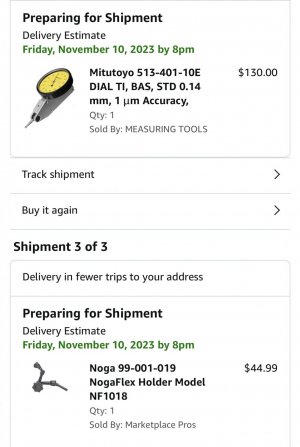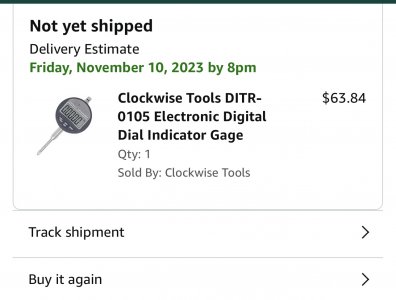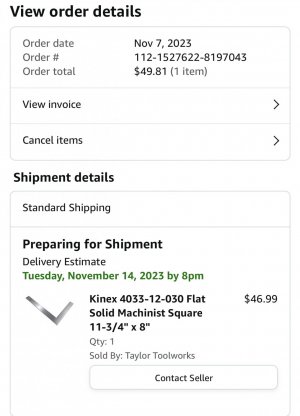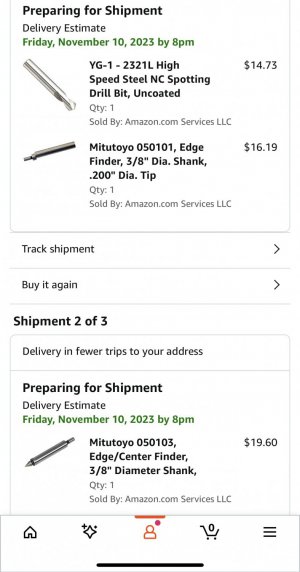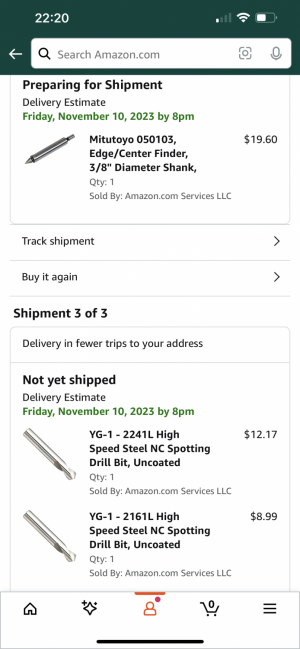- Joined
- Sep 1, 2023
- Messages
- 976
No, you're absolutely right, but confidence will only come with time turning handles. You have undertaken a very difficult hobby that will reward you if you put in the time. Plus, the learning curve is near vertical.
Trust me, its you, its me, its the guy across the room, this is why curse words were invented. Even if it is just simply the operator making a bad setup.
If its your very first month or year of running a given machine you have a good reason to have these concerns.
But to my mind, once you perform a process on a machine well, at least once, the machine generally does not change in a short enough timeframe for you to notice. Chipping an insert or losing the edge on a tool bit or endmill will change performance, but these are things that are generally understood and looked at when an issue arises.
Now to relate this to you or others who are just beginning, if you're having a problem, ask yourself "What's the variable" or "What is causing this issue".
Is it the machine?
Could be, but if so this will be shown as a repeatable problem.
Is it the tooling?
Might be, can you uncover something that is not right? A wobbly setup, something not tightened down correctly or as above, a bad cutting edge? A magnifying glass might be needed to uncover a flaw in a cutting edge you might otherwise see as sharp. Dull cutting edges can induce vibration, cause excessive heat (Did your chips change color?), or noise that was not there prior.
Or is it operator induced?
Many times it is, this is why I'm saying just make stuff. Pick something simple and just make it. A tool for the shop, a fidget spinner, mill your name in a piece of aluminum, then work your way up to doing it in steel. But for gods sake(<<<The Japanese wine) don't jump in with both feet in your first year and try and make a working miniature Ferrari engine.
Keep in mind, you, me, him are the least reliable thing in the equation, and some days are just not good days. Ill have days where I feel superhuman and everything goes my way. Other days I cant seem to do a damn thing right.
On the good days I roll with it. Ill get 4-5 good hours before becoming fatigued and things start to go pear shaped. Know when to say when.
On days where I'm just not doing well I find something that is productive where I can do less harm. Ill organize, clean, sort, draw up plans.
You have a desire to do this difficult thing we all like to do here, and its important to understand yourself and that some days you just don't have it. If something frustrates you just set it aside and come back to it rested and in a good frame of mind.
You'll get it.
BTW, who is Rollies dad?
Thank you. That was a really interesting and sane read.
I suspect a fair number of us beginners have had previous experience of 'kit-based' hobbies and have been burned in the past.
Burned where we've got interested in something, maybe not done quite enough research, possibly not spent our money on our starting kit wisely and found that we've had a terrible time starting; experienced relentlessly inconsistent and poor results from seemingly correct techniques, unexplainable (to us) failures when we're doing something so basic that there seems little we could have messed up and the frustration that comes with that.
I saw this in field target air rifle shooting in the UK back in the 90's (I was very lucky in that when I started I had a good sensible mate who got me into it and made sure I bought a basic but good quality rifle and scope to start and taught me a lot about shooting field target); poor buggers who turned up with terrible budget rifles who's triggers couldn't be adjusted or fettled into any sort of clean break or cheap scopes that couldn't cope with a spring air rifle's action and would lose zero after a few shots. If they were lucky someone at the club (my mate, me or a couple of other decent sorts) would let them shoot their decent rifle or even lend them their spare rifle. Eh...I'm rambling now.
Anyway, the upshot is that I suspect that there is this learned terror of never getting anywhere with a kit-based hobby; not because you're crap but because there's something amiss with your setup and never finding out.
That's why some beginners might think they need to get everything adjusted and set up and levelled and aligned out of the gate so they can be sure their failures are explicable and can be corrected rather than just some random unexplained act of a cruel god!
"Some beginners"...eh, who am I trying to kid?
That's me there I'm talking about. I'm the guy who has disassembled his 7x14, cleaned and degreased every component, deburred every contact surface and is about to have a second go at replacing the headstock's deep groove ball bearings with angular contact bearings (the less said about the first go the better). All this before he's even put any stock in the chuck.
I should have just put a piece of brass or aluminium round bar in the chuck and had a play really but...I'm a programmer by trade. I reckon 30 years of always wanting to measure the success of my inputs (code) with what the outputs are (results) by testing have made me what I am for better or worse!

